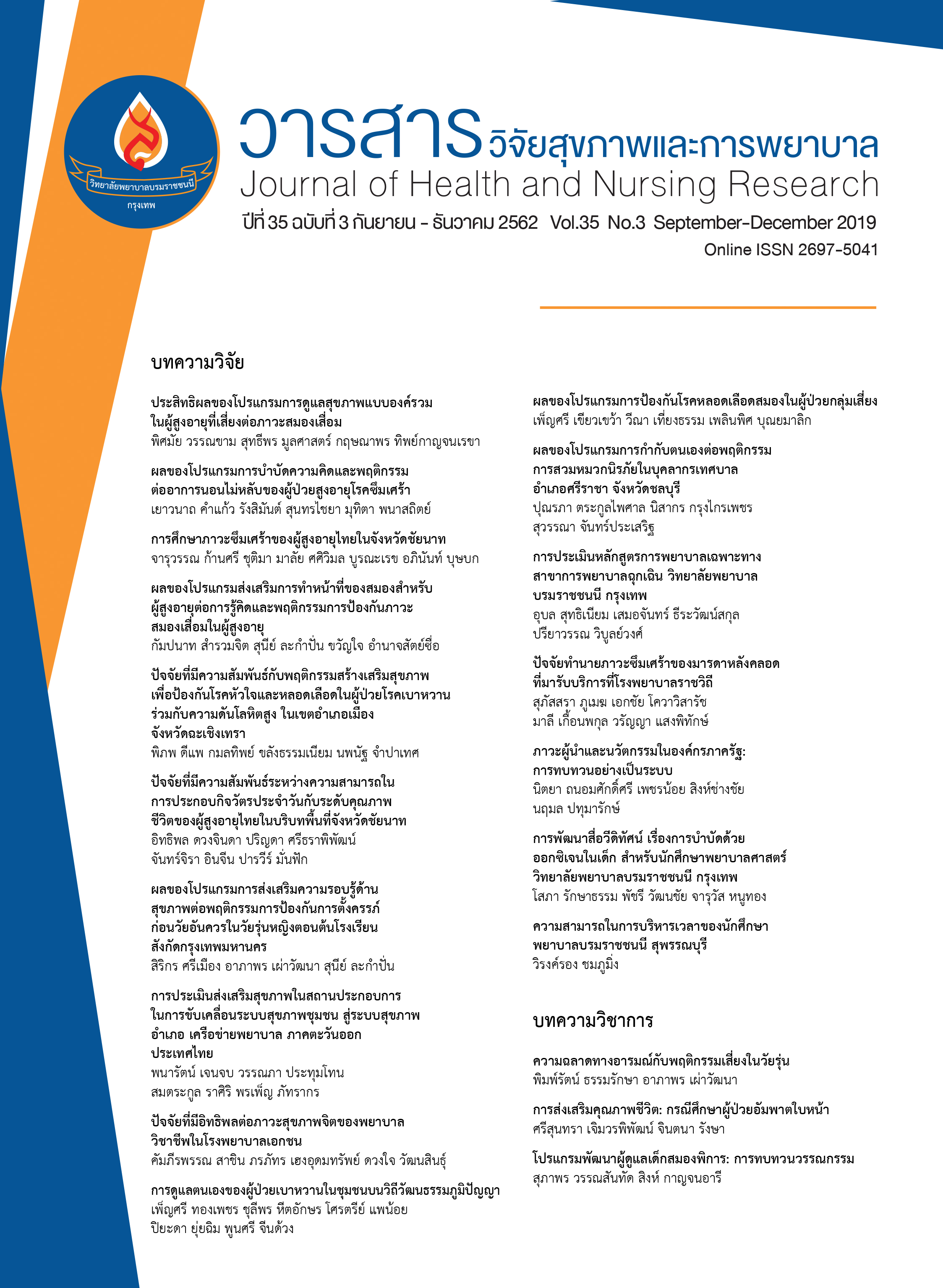ปัจจัยที่มีอิทธิพลต่อภาวะสุขภาพจิตของพยาบาลวิชาชีพในโรงพยาบาลเอกชน
คำสำคัญ:
ปัจจัยทำนาย, ภาวะสุขภาพจิต, พยาบาลวิชาชีพบทคัดย่อ
การวิจัยแบบหาความสัมพันธ์เชิงทำนายครั้งนี้มีวัตถุประสงค์เพื่อศึกษาภาวะสุขภาพจิตและปัจจัยที่มีอิทธิพลต่อภาวะสุขภาพจิตของพยาบาลวิชาชีพในโรงพยาบาลเอกชนแห่งหนึ่ง กลุ่มตัวอย่างเป็นพยาบาลวิชาชีพระดับปฏิบัติการ ได้มาด้วยวิธีการสุ่มตัวอย่างอย่างง่าย จำนวน 100 คน เครื่องมือวิจัย ได้แก่ แบบสอบถามข้อมูลส่วนบุคคล แบบวัดภาวะสุขภาพจิต แบบวัดคุณภาพการนอนหลับ แบบวัดความฉลาดทางสังคม แบบวัดพลังสุขภาพจิต และแบบวัดสมดุลชีวิตกับการทำงาน
ได้ค่าความเชื่อมั่นเท่ากับ .93 .70 .91 .88 และ .80 ตามลำดับ วิเคราะห์ข้อมูลด้วยสถิติเชิงพรรณนา และการวิเคราะห์ถดถอยพหุคูณแบบขั้นตอน
ผลการศึกษาพบว่า ภาวะสุขภาพจิตในภาพรวมมีคะแนนเฉลี่ยเท่ากับ 3.14 (SD. = 4.33) แสดงถึงกลุ่มตัวอย่างมีสุขภาพจิตดี ร้อยละ 24.00 ของกลุ่มตัวอย่างมีคะแนนภาวะสุขภาพจิตที่แสดงว่ามีปัญหาสุขภาพจิต คุณภาพการนอนหลับและสมดุลชีวิตกับการทำงานสามารถร่วมกันทำนายภาวะสุขภาพจิตของกลุ่มตัวอย่างได้ ร้อยละ 32.60 (R2 = .326, p < .001) โดยคุณภาพการนอนหลับมีอิทธิพลต่อภาวะสุขภาพจิตมากที่สุด (ß = .453) รองลงมาคือ ความสมดุลชีวิตกับการทำงาน (ß = -.194)
ผลการศึกษานี้มีข้อเสนอแนะว่า ผู้บริหารการพยาบาลควรพัฒนารูปแบบหรือกิจกรรมที่เน้นการส่งเสริมคุณภาพการนอนหลับที่ดีและความสมดุลระหว่างชีวิตกับการทำงาน เพื่อส่งเสริมภาวะสุขภาพจิตของพยาบาลวิชาชีพ โดยเฉพาะอย่างยิ่งพยาบาลที่ปฏิบัติงานในโรงพยาบาลเอกชน
Downloads
เอกสารอ้างอิง
2. Toojinda K. Quality of life of registered nurses in Bumrungrad International Hospital [Master’s Thesis]. Bangkok: Chulalongkorn University; 2010. (in Thai).
3. Bejrsuwana A, Suwannapong N, Howteerakul N, Boonshuyar C. Nurses' Quality of Work Life in Private Hospital. Kuakarun Journal of Nursing 2012;19(2):103-17. (in Thai).
4. Sricamsuk Saito A, Voraharn W, Senarak W. Happiness of Undergraduate Nursing Students, Faculty of Nursing, Khon Kaen University. Journal of Nursing Science & Health 2011;34(2):71-9. (in Thai)
5. World Health Organization [WHO]. Mental health [Internet]. 2014. Avaliable from: http://www.who.int/ topics/mental_health/en.
6. Goldberg DP. The detection of psychiatric illness by questionnaire: A technique for the identification and assessment of non-psychotic psychiatric illness. England: Oxford University Press; 1972.
7. Rangsing C. Quaility of sleep and mental health of professional nurses in government hotpital [Master’s Thesis]. Bangkok: Chulalongkorn University; 2007. (in Thai).
8. Goleman D. Social Intelligence: The new science of human relationships. New York: Bantam Books;2006.
9. Kihlstrom JF, Cantor N. Social intelligence. In R. J. Sternberg (Ed.), Handbook of intelligence. 2nd ed. Cambridge: Cambridge University Press; 2000:359-379.
10. Inkaew S, Phalitnontkiet Y, IamSa-at S, Danwattana S. Turning bad into good: Resilience Quotient. Nonthaburi: Bureau of Social Mental Health, Department of Mental Health, Ministry of Public Health.2009. (in Thai).
11. Beecorft PC, Dorey F, Wenten M. Turnover intention in new graduate nurses: A multivariateanalysis. Journal of Advanced Nursing 2008;62(1):41-52.
12. Gito M, Ihara H, Ogata H. The relationship of resilience, hardiness, depression and burnout among Japanese psychiatric hospital nurses. Journal of Nursing Education and Practice 2013;3(11):12-8.
13. Chompunud S, Inkaew W. Resilience Quotient, Emotional Quotient, and stress in nursing students Thai Red Cross College of Nursing. The Journal of Psychiatric Nursing and Mental Health 2012;26(2):87-98. (in Thai).
14. Chommalee S. A Study of the Relationships Between the Resilience Quotient and the Mental Health Status of the Unemployed: A Case Study of the Office of Employment, Bangkok Area 5 [Master’s Thesis]. Bangkok: Ramkhamhaeng University; 2012. (in Thai).
15. Jannoppacun J, Suppapitiporn S. Predictive Factors for the Resilience Quotient of New Nursing Graduates on Rotational Duty at Chulalongkorn Hospital. Thai Journal of Nursing Council 2015;30(2):113-26. (in Thai).
16. Dex S, Bond S. Measuring work-life balance and its covariates. Work Employment Society. 2005;19:627-36.
17. Pechsen S. The Relationship Between Emotional Quotient and Achievement Motivation of Professional Nurses in Police General Hospital [Master’s Thesis]. Bangkok: Ramkhamhaeng University; 2007. (in Thai).
18. Sawaengdee K, Thungjaroenkul P, Noree T, Pagaiya N. A summary report of the study project on health and work life of professional nurses in Thailand. Nonthaburi, International Health Policy Program: IHPP, Ministry of Public Health. 2010. (in Thai).
19. Wattannakitkrileart D, Nakasawasdi K, Cheewapoonphon C, Sattayawiwat W. Stress management and stress related factors in nurse. Journal of nursing 2010;28(1):67-76. (in Thai).
20. Nilchaikovit T, Sukying C, Silpakit C. Reliability and validity of the Thai version of the General Health Questionaire. Journal of the Psychiatrist Association of Thailand 1996;41(1):2-17. (in Thai).
21. Chaabutr P. Correlation of Mental Health, Working Environment and Work Ability of Professional Nurses in Hospitals under Public Health Ministry Pathum Thani Province. Eastern Asia University Heritage Journal Science and Technology 2014;8(1):171-83. (in Thai).
22. Buysse DJ, Reynolds CF, Monk TH, Hoch CC, Kupfter DJ. Quantification of subjective sleep quality in healthy elderly men and women using the Pittsburgh sleep quality index. Sleep, 1991;14(4):331-38.
23. Jirapramukpitak T, Tanchaiswad W. Sleep disturbances among nurses of Songklanagarind Hospital. Journal of the Psychiatrist Association of Thailand 1997;42(3):123-32. (in Thai).
24. Suwitthayarat K. The study and development of social intelligence for higher education students in the south of Thailand. Counseling Psychological; Srinakharinwirot University; 2014. (in Thai).
25. Department of Mental Health. Turning bad into good: Resilience Quotient, RQ. Bureau of Psychosocial Health Department of Mental Health, Ministry of Public Health. 2009. (in Thai).
26. Grotberg EH. I am, I have, I can: Family worldwide taught us about resilience. Reaching Today's Youth: The Community Circle of Caring Journal 1998;2(3):36-9.
27. Jannoppacun J. Resilience Quotient (RQ) of newly rotating graduated nurses of King Chulalongkorn Memorial Hospital [Master’s Thesis]. Bangkok: Chulalongkorn University; 2014. (in Thai).
28. Kaewtawee A. Relationships between work-life balance, safe work practice and organizationalcommitment of professional nurses at private hosiptals in
Southern region [Master’s Thesis].Bangkok: Chulalongkorn University;2012. (in Thai).
ดาวน์โหลด
เผยแพร่แล้ว
รูปแบบการอ้างอิง
ฉบับ
ประเภทบทความ
สัญญาอนุญาต
บทความที่ได้รับการตีพิมพ์ เป็นลิขสิทธิ์ของวารสารวิจัยสุขภาพและการพยาบาล (วิทยาลัยพยาบาลบรมราชชนนี กรุงเทพ) ไม่สามารถนำไปตีพิมพ์ซ้ำในวารสารฉบับอื่น


















